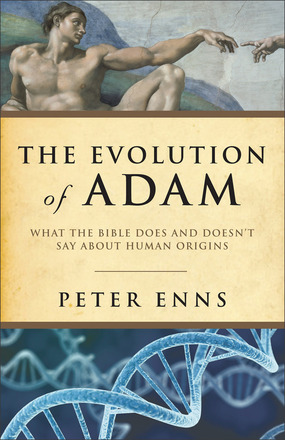Peter Enns: The Evolution of Adam
 Peter Enns, The Evolution of Adam: What the Bible Does and Doesn’t Say About Human Origins (Grand Rapids: Brazos Press, 2012), 170 pages, ISBN 9781587433153.
Peter Enns, The Evolution of Adam: What the Bible Does and Doesn’t Say About Human Origins (Grand Rapids: Brazos Press, 2012), 170 pages, ISBN 9781587433153.
Peter Enns brings his considerable academic training and writing ability to bear on the thorny subject of Scripture and evolution. He believes that the evidence for evolution is so overwhelming that Christians hurt the cause of Christianity by continuing to hold on to a literal (i.e. historical) reading of creation account in Genesis. In this regard, he echoes Augustine’s concerns. But rather than proffering a grand harmonization between evolution’s and Genesis’ account of origins, Enns addresses a single component that impedes progress towards a resolution, namely the historicity of Adam.
Enns recognizes that the task before him is great. He contends that the belief in an historical Adam flows not from a direct or plain reading of the scripture but from a cultural and theological reading of scripture, called an “interpretive reading.” An interpretive reading is where the tradition around a text becomes the meaning of the text even if the text doesn’t clearly state that reading. For example, consider the story of Advent. We are taught, and may even believe, that Joseph put Mary on a donkey for the journey from Nazareth to Bethlehem even though the bible says nothing about a donkey.
To break the grip that our ‘interpreted reading’ of Adam has on us, Enns endeavors to create cognitive dissonance in readers by methodically questioning the foundation supporting the interpreted reading. He begins by stating (and with very little reference to specifics or scholarship) that archeology and science provide so much evidence against an historical reading of Genesis that to ignore it would violate our commitment to common sense and grammatico-historical exegesis. Genesis, therefore, is not about cosmic history but about how Israel came into being. In turn, Adam is not the first human, he is the first Israelite, or proto-Israelite.
Enns recognizes that many theologians contend that Paul’s use of Adam (Rom 5; 1 Cor 15) demonstrates that Adam was a historical person. Enns responds that Paul’s use of Adam does not necessarily support the notion of an historical Adam because 1. His arguments were conditioned by the style of argumentation present in his day, 2. Paul’s style of argument is complex and not always easily followed, 3. We only know half the story because Paul’s writings were letters, 4. Paul often didn’t read the Old Testament plainly but rather through the lens of his encounter with Jesus Christ, and 5. Just because we jettison the notion of Adam as the first historical being doesn’t mean that Paul’s theological arguments fall too.
Category: Biblical Studies, Spring 2014


